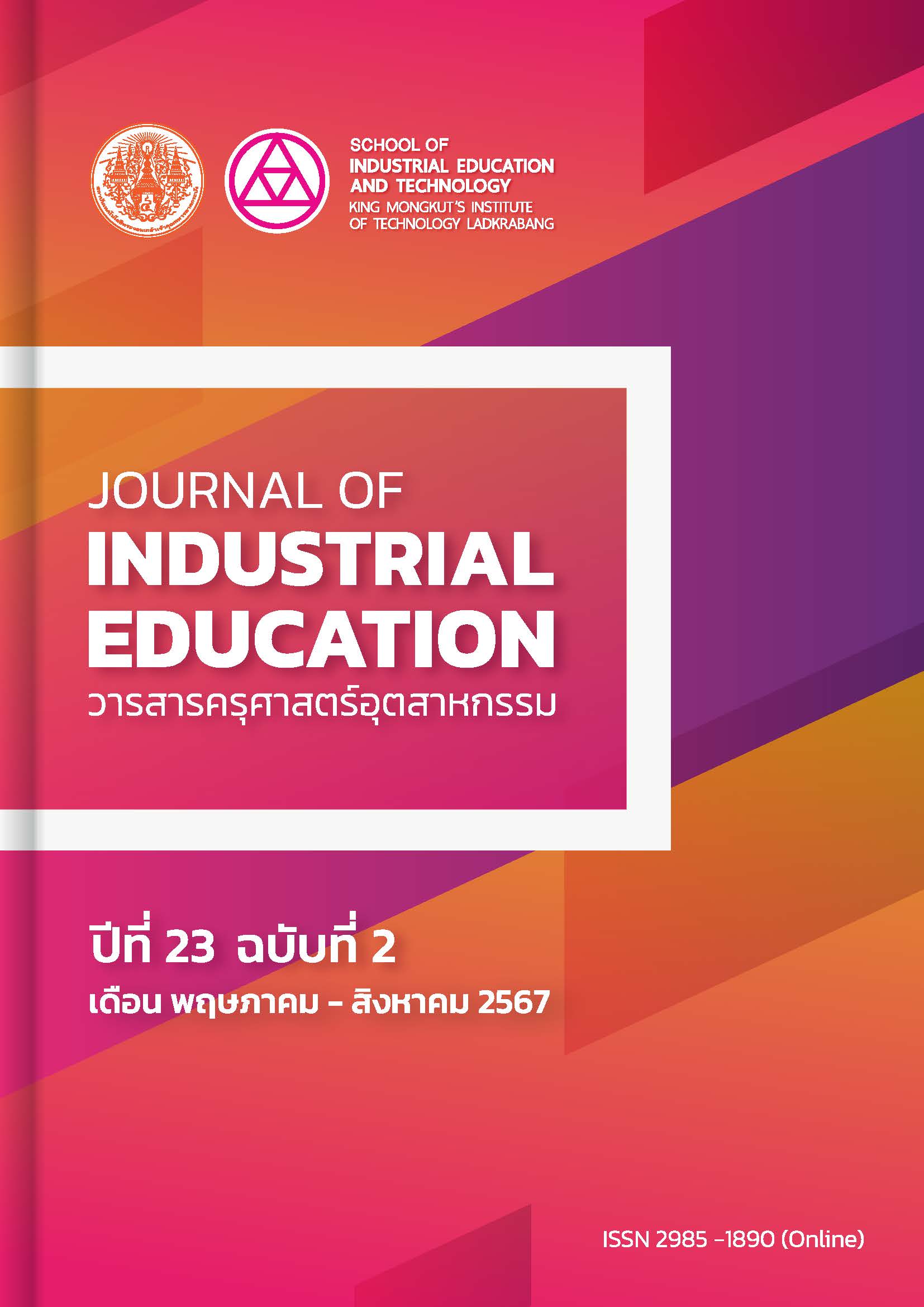การศึกษาสถานการณ์และความคาดหวังในอนาคตด้านสมรรถนะแรงงานที่จบการศึกษาระดับปริญญาตรีของสถานประกอบการ กลุ่มอุตสาหกรรมผลิตชิ้นส่วนยานยนต์
DOI:
https://doi.org/10.55003/JIE.23210คำสำคัญ:
สมรรถนะแรงงาน, อุตสาหกรรมผลิตชิ้นส่วนยานยนต์, สถานการณ์ปัจจุบัน, ความคาดหวังอนาคต, การวิเคราะห์ช่องว่างบทคัดย่อ
การศึกษาสถานการณ์ปัจจุบันและความคาดหวังอนาคตด้านสมรรถนะแรงงานที่จบการศึกษาระดับปริญญาตรีของสถานประกอบการกลุ่มอุตสาหกรรมยานยนต์และผลิตชิ้นส่วนยานยนต์ วิเคราะห์ช่องว่างระหว่างสมรรถนะแรงงานที่จบการศึกษาระดับปริญญาตรีปัจจุบันและสมรรถนะแรงงานจบการศึกษาระดับปริญญาตรีที่สถานประกอบการคาดหวัง การเก็บข้อมูล โดยแบบสอบถามจากบุคลากรที่ปฏิบัติงานในสถานประกอบการ กลุ่มอุตสาหกรรมผลิตชิ้นส่วนยานยนต์ ผู้ผลิตชิ้นส่วนยานยนต์ในลำดับที่ 1 และผู้ผลิตชิ้นส่วนยานยนต์ในลำดับที่ 2 จำนวน 80 คน จาก 20 สถานประกอบการ ได้แก่ ตำแหน่งผู้บริหารระดับหัวหน้าแผนกขึ้นไป วิศวกร และพนักงาน ที่มีประสบการณ์ในการทำงานอย่างน้อย 5 ปีขึ้นไป โดยเป็นสถานประกอบการที่มีการลงนามความร่วมมือในการจัดการเรียนรู้แบบบูรณาการเรียนรู้ร่วมกับการทำงานกับมหาวิทยาลัยเทคโนโลยีพระจอมเกล้าธนบุรี ในกรุงเทพมหานคร และปริมณฑล โดยการเลือกแบบเจาะจง ผลวิจัยพบว่าสมรรถนะแรงงานที่จบการศึกษาระดับปริญญาตรี ของสถานประกอบการในปัจจุบัน ด้านความรู้ในการปฏิบัติงานของตนเอง มีค่าเฉลี่ยมากที่สุด เท่ากับ 3.720 ด้านทักษะมีทักษะการเรียนรู้ มีค่าเฉลี่ยมากที่สุด เท่ากับ 3.800 และด้านคุณลักษณะ มีความรับผิดชอบต่อสังคม มีค่าเฉลี่ยมากที่สุด เท่ากับ 4.080 ผลการวิเคราะห์ช่องว่างระหว่างสมรรถนะแรงงานที่จบการศึกษาระดับปริญญาตรีของสถานประกอบการในปัจจุบันและความคาดหวังเกี่ยวกับสมรรถนะแรงงานที่จบการศึกษาระดับปริญญาตรีในอนาคต พบว่ามีค่าเฉลี่ยที่แตกต่างกันอย่างมีนัยสำคัญทางสถิติที่ระดับ .05 ทุกด้าน โดยด้านคุณลักษณะ มีค่าเฉลี่ยความคาดหวังมากที่สุด เท่ากับ 4.440 รองลงมาด้านทักษะ มีค่าเฉลี่ยเท่ากับ 4.160 และด้านความรู้ มีค่าเฉลี่ยเท่ากับ 3.972 ตามลำดับ
เอกสารอ้างอิง
Apriyani, D., Krisnawati, M., Sudana, I. M., Angraeni, N. S., & Setiawati, T. D. (2023). Improving student competence through industrial internship learning. In A. Kusumastuti, S. Anis, A. N. Hidayanto, S. Nurmasitah, A. Atika, D. Apriyani, T. A. Achmadi, & S. Sudiyono (Eds.), Proceedings of the 4th Vocational Education International Conference (VEIC 2022: Part of ASSEHR Series) (pp. 46-52). Atlantic Press.
Asean Automotive Federation. (2022). Asean Automotive Federation 2022 statistics. https://www.asean-autofed.com/files/AAF_Statistics_2022.pdf
Bank of Thailand. (2021). Thailand labor market restructuring (White Paper). EEC and Bank of Thailand. (in Thai)
Donlao, T., Fuangchan, S., Chirinang, P., & Kromadit, V. (2021). The future of Thai workers in changing economy. Journal of Administrative and Management Innovation, 9(1), 35-44. (in Thai)
Kearney, A. T. (2017). Technology and innovation for the future of production: Accelerating value creation. World Economic Forum.
Khampirat, B., Pop, C., & Bandaranaike, S. (2019). The effectiveness of work-integrated learning in developing student work skills: A case study of Thailand. International Journal of Work-Integrated Learning, 20(2), 126-146.
Kontip, W. (2021). Competency developing of smart hand-on engineers for supporting sustainable industry 4.0 [Master’s thesis]. Rajamangala University of Technology Phra Nakhon. (in Thai)
Leingchan, R. (2018). The automotive industry of the future (Research Intelligence Report). Krungsri Research. (in Thai)
Limphothong, S. (2022). Development of strategic leadership model for Thai industial factories. Journal of Social Science and Buddhistic Anthropology, 7(9), 61-79. (in Thai)
Limrueangrong, P., & Thaweepaiboonwong, J. (2021) The influence of human resource development on employee performance: The mediating role of competency. Journal of Humanities and Social Sciences, 14(27), 75-86. (in Thai)
Office of the Secretariat of the Education Council. (2022). Study and analysis of methods for developing high-performance workforce that are linked with area based development (Report). Author. (in Thai)
Organization for Economic Co-operation and Development. (2018). the future of education and skills: Education 2030. https://www.oecd.org/education/2030/E2030%20Position%20Paper%20(05.04.2018)
Organization for Economic Co-operation and Development. (2020). Thailand’s education system and skills imbalances: Assessment and policy recommendations. https://www.oecd-ilibrary.org/economics/thailand-s-education-system-and-skills-imbalances-assessment-and-policyrecommendations_b79addb6-en
Thuan-nadi, A. (2016). Analysis of demand for qualitative labor of industrial sector in chonburi province under liberalization of the ASEAN economic community. Journal of Economics and Management Strategy, 3(2), 35-49. (in Thai)
Tongsuar, W. (2023). Looking at the direction of the Thai automotive parts industry in 2023- 2024, automobile production will recover support business growth continuously (Research Note Report). Krungsri Research. (in Thai)
Wiriyasakulthon, J., Maphut, C., & Kosaiyawat, S. (2020). The scenario of competencies-based for graduate Thai students. Journal of Education and Social Development, 15(2), 81-91. (in Thai)
Yongpisanphob, W. (2022). Business/Industry trends 2023-25 automotive parts industry (Report). Krungsri Research. (in Thai)
ดาวน์โหลด
เผยแพร่แล้ว
รูปแบบการอ้างอิง
ฉบับ
ประเภทบทความ
สัญญาอนุญาต
ลิขสิทธิ์ (c) 2024 วารสารครุศาสตร์อุตสาหกรรม

อนุญาตภายใต้เงื่อนไข Creative Commons Attribution-NonCommercial-NoDerivatives 4.0 International License.
"ข้อคิดเห็น เนื้อหา รวมทั้งการใช้ภาษาในบทความถือเป็นความรับผิดชอบของผู้เขียน"



